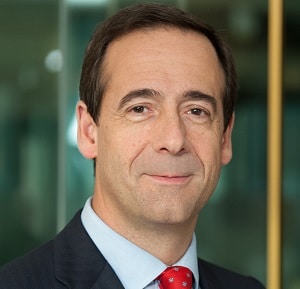CEO Gonzalo Gortázar discusses CaixaBank’s distinctive socially responsible model, the impact of the Covid-19 pandemic and its future following its merger with Bankia.

Global Finance: What sets CaixaBank apart from competitors as a consumer bank?
Gonzalo Gortázar: The essence of CaixaBank is a socially responsible universal banking model based on quality, proximity to customers and specialization in products and services. Quality of service, which includes both the relationship with our more than 15.4 million customers as well as internal processes managed by over 35,000 employees, is one of the bank’s primary values and its first strategic challenge. It is also a key competitive lever. CaixaBank adheres to a highly demanding quality guideline focused on trust, proximity, efficiency and continuous improvement. Our commitment to innovation, technology and the development of a leading multi-channel distribution system that allows us to be available to customers anywhere and at any time makes it easier for us to build a closer and more personal relationship with customers. It also enhances the advisory services we offer.
GF: Tell us more about CaixaBank’s socially responsible model.
Gortázar: At the heart of the group’s Strategic Plan is the aim to set a benchmark in responsible banking and social commitment. Our purpose is to contribute to the financial well-being not only of our clients but also to support the progress of the communities where we operate and of society as a whole.
As part of this commitment, the bank follows the UN Sustainable Development Goals (SDGs), set out in the UN 2030 Sustainable Development Agenda, including the goals on responsible production and consumption and climate action. The SDGs are integrated into both CaixaBank’s Strategic Plan and its Socially Responsible Banking Plan. These commitments will help us to consolidate our leadership following the merger agreement that we have reached with Bankia.
GF: How will the current pandemic change retail banking?
Gortázar: The pandemic is affecting us in two dimensions, fundamentally. On one hand, physical contact is and will remain restricted for some time. As a consequence, there is the need to transform many of our business and management processes. Health and customer protection protocols are foremost in our branches and headquarters, cash is giving way to electronic payments, digitalization accelerates, and innovative and non-physical ways of serving customers need to be deployed. These changes are already happening and need further focus and investment.
On the other hand, and most importantly, a sudden and deep economic crisis has started, with a recovery path still unknown. This has put a tremendous stress on many sectors and millions of customers, whose priorities have changed overnight. Now they need liquidity, access to credit, debt restructuring or digitalization of their processes.
From the very beginning of the outbreak, CaixaBank put in motion numerous measures to help our customers. Among them it is worth mentioning the advance payment of pensions and unemployment benefits to more than 3.6 million clients, implementation of more than 350,000 credit moratoria and the rapid extension of new credit of different kinds, exceeding €15 billion. We also offered rental payment holidays to tenants of our real estate portfolio, benefitting more than 4,500 families, and waived various fees to more vulnerable customer segments.
CaixaBank continues to make social responsibility a top priority.We will certainly make our best efforts to mitigate the physical and economic effects of the coronavirus outbreak for our clients and stakeholders and help support the economy.
GF: What are your main concerns about the future for the bank? What keeps you up at night?
Gortázar: Of course, global economic circumstances, including the pace of the economic recovery, the evolution of the pandemic, and how soon we will have a vaccine. These issues affect our macro scenario so deeply that we are forced to rethink strategies to ensure ways that we can be more agile at providing the best solutions and services to our clients.
That being said, we have shown the market that we have a model that is resilient in a low-interest-rate scenario. Despite these less-than-ideal macro circumstances, and although our most recent results were naturally affected by the prudent steps we’ve carried out, they also show significant improvement in terms of customer activity. That places us in good stead to report further improvement in the future. This we owe 100% to the unwavering commitment of our employees and the support of our shareholders.
Looking forward, while the recent merger agreement with Bankia will keep us busy in the next couple of years, it will also reinforce our competitive position, our ability to serve our clients and our profitability, benefitting our shareholders and the whole community.



